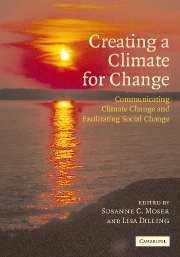Book contents
- Frontmatter
- Contents
- Preface
- Foreword
- List of contributors
- List of tables
- List of figures
- List of text boxes
- Introduction
- Part I Communicating climate change
- Part II Facilitating social change
- Part III Creating a climate for change
- 31 An ongoing dialogue on climate change: The Boulder Manifesto
- 32 Toward the social tipping point: creating a climate for change
- About the authors
- Index
- References
31 - An ongoing dialogue on climate change: The Boulder Manifesto
Published online by Cambridge University Press: 20 August 2009
- Frontmatter
- Contents
- Preface
- Foreword
- List of contributors
- List of tables
- List of figures
- List of text boxes
- Introduction
- Part I Communicating climate change
- Part II Facilitating social change
- Part III Creating a climate for change
- 31 An ongoing dialogue on climate change: The Boulder Manifesto
- 32 Toward the social tipping point: creating a climate for change
- About the authors
- Index
- References
Summary
As to methods there may be a million and then some, but principles are few … The man who tries methods, ignoring principles, is sure to have troubles.
Ralph Waldo EmersonThe rich and diverse perspectives reported in this volume reflect the emergence of a new and unique social learning network on climate change communication and social change. The threads for a new fabric of knowledge have been gathered. The next steps are to weave together these fragments of thought, to move from knowledge sharing to actual dialogue, and to create a new learning ecology that effectively encourages the more environmentally sustainable behaviors necessary to avoid the dangerous impacts of climate change. This chapter presents the Boulder Manifesto that articulates the book's contributors' collective way of seeing the climate change communication challenge and of understanding our part in creating it – as it is and might be. The utility of a manifesto lies in providing a conceptual aperture, an opening through which future social realities may unfold. The nature of the Boulder Manifesto rests on the expertise, spirit of barn-raising and commitment to a common cause that is threaded through the preceding chapters. A continuing and successful dialogue among the diverse stakeholders represented in this volume will be an enormous challenge – dialogue is a state out of which we are continuously falling (Isaacs, 1999).
In the case of sustained local and regional action on threats posed by climate change there are potential pitfalls ahead.
- Type
- Chapter
- Information
- Creating a Climate for ChangeCommunicating Climate Change and Facilitating Social Change, pp. 485 - 490Publisher: Cambridge University PressPrint publication year: 2007
References
- 2
- Cited by

